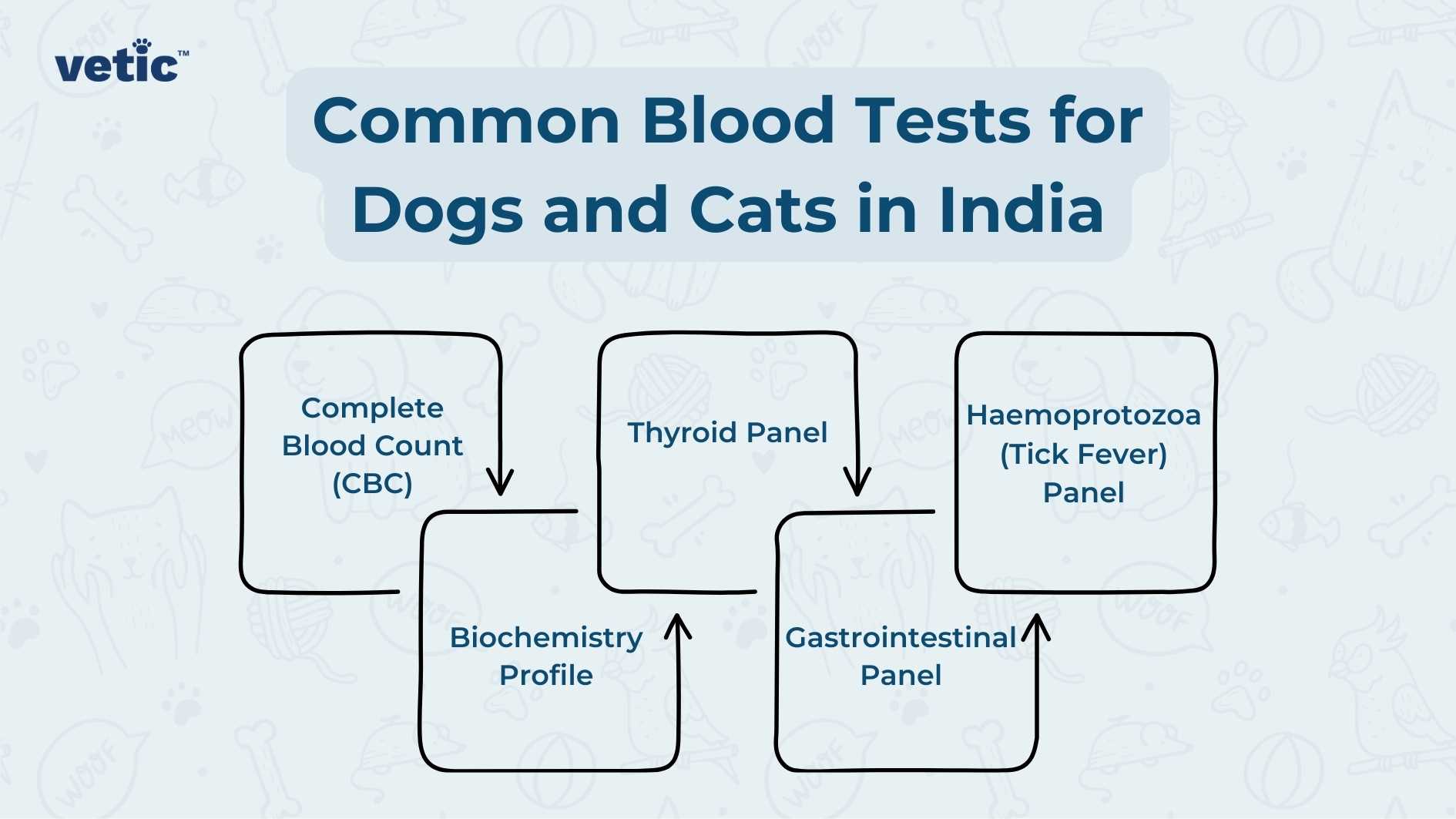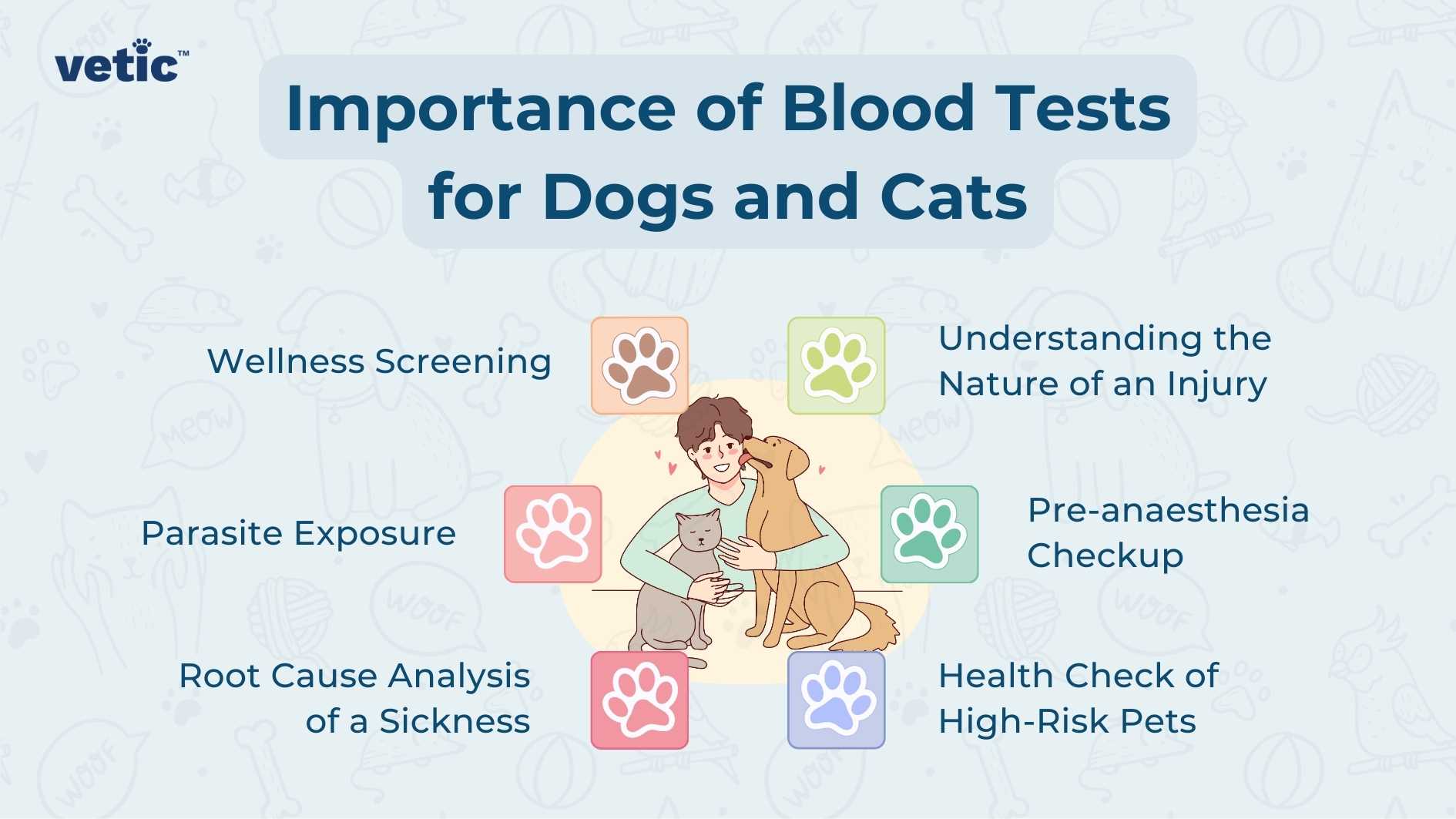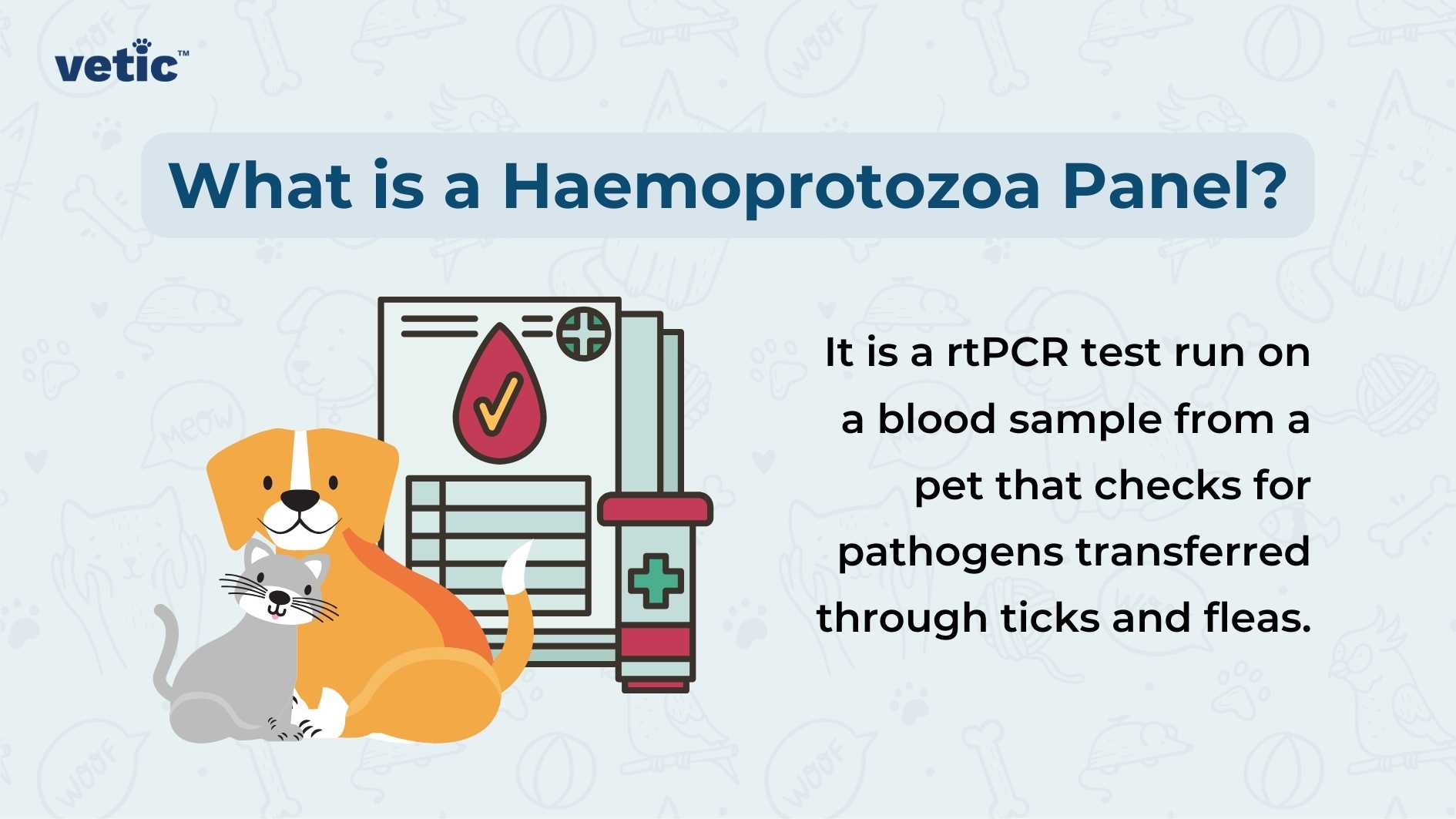Blood tests for dogs and cats have irreplaceable diagnostic value. Annual or biannual blood tests for pets can reveal your pet’s overall health status, early signs of a disease or the progress of a disease.
Myth: Only sick pets need blood tests.
Fact: All pets need blood tests at least once a year. Senior pets who are predisposed to genetic disorders may require blood tests twice a year.
Why Do Pets Need Blood Tests?

Blood tests can reveal any hidden disease or disorder, and give you the chance to begin treatment early so they continue to enjoy a high quality of life.
Blood tests for pets are common diagnostic screening tests for multiple diseases. In other cases, pets may require blood tests if they are showing signs of sickness including diarrhoea, vomiting, fever or skin problems.
How are Blood Tests in Pets Done?
Typically, dogs and cats do not require any anaesthesia during the blood drawing process. Depending on the age of your pet, number of tests and their type, hardly 2-4 ml of blood is drawn for the whole panel of tests.
The veterinarian draws the blood with a sterile needle into a vial from your pet’s leg (vein) while the paraveterinarian or veterinary nurse comforts and holds your pet. At most, your veterinarian may request you to put an e-collar (Elizabethan collar) on your pet during the collection process.
Understand that an e-collar is used for the health benefit of your pet. The lesser they move, the higher are the chances that the blood collection will go smoothly. Sudden movements or displays of aggression can cause the needle to move inside the vein or piece through it causing swelling and blood clot(s).
What are the Common Blood Tests for Dogs and Cats in India?

The annual blood tests for dogs and cats usually measure components of the blood including different types of cells, hormones, proteins and electrolytes.
Depending on your pet’s overall health, age and history, the veterinarian may recommend the following blood tests –
Complete Blood Count (CBC)
A Complete Blood Count or CBC test will check the number of Red Blood Cells (RBCs), different White Blood Cells (WBCs), such as neutrophils, monocytes, lymphocytes, eosinophils and basophils. CBC also includes platelet count, which can reveal whether your pet is dehydrated or has anaemia. Higher levels of WBCs usually indicate the presence of an infection (viruses, bacteria, protozoa or parasites).
Biochemistry Profile
Biochemistry parameters are drawn from the presence of certain proteins (enzyme levels), electrolytes and minerals in the blood samples. These parameters reflect the pet’s organ function.
The common annual blood tests for dogs and cats include biochemistry tests such as Liver Function Test (LFT) and Kidney Function Test (KFT).
LFT consists of the measurement of liver enzymes and proteins such as total bilirubin, total serum protein, albumin, globulin, albumin:globulin ratio, SGPT (alanine aminotransferase or ALT), SGOT and Alkaline phosphatase. Kidney function test typically consists of blood urea nitrogen (BUN), urea, creatinine, sodium, potassium, calcium, phosphorus and bicarbonate.
Thyroid Panel
Thyroid panel measures the levels of T3, T4, Free T4, and TSH. The values reflect the health and function of the thyroid gland. It can explain several common signs of sickness in dogs and cats including lethargy, excess weight gain or sudden weight loss, loss of appetite and recurring ear infections.
Gastrointestinal Panel
The gastrointestinal panel checks the levels of enzymes that play crucial roles in digestion and nutrient absorption. The panel includes lipase, amylase, Vitamin B12 and PLI.
The GI panel reveals the health and function level of the gut and pancreas.
Haemoprotozoa Panel
The veterinarian may recommend a haemoprotozoa panel if your pet is sick or has a history of ticks and fleas. Haemoprotozoa has become a common health threat to dogs and cats. This is an advanced rtPCR test that reveals the presence of particular pathogens in your dog’s or cat’s blood. Early diagnosis can help timely and effective treatment and management of haemoprotozoa in cats and dogs.
What’s the Importance of Blood Tests for Dogs and Cats?

Blood tests for pets can reveal internal issues that are not yet symptomatic. They can determine the exact cause of a physical discomfort or distress in pets.
Since our dogs and cats cannot speak about their discomfort, it is important to complete these blood tests every year to understand their health and metabolism. Blood works are necessary for multiple reasons:
Wellness Screening
Regular blood tests help in early detection of health issues, ensuring your pet stays healthy and receives timely treatment.
Root Cause Analysis of a Sickness
Blood work helps pinpoint the exact cause of your pet’s illness, aiding veterinarians in choosing the best treatment plan.
Understanding the Nature of an Injury
Blood tests provide insight into internal injuries and their severity, guiding appropriate medical interventions.
Pre-anaesthesia Checkup
Before surgery, blood work ensures your pet is healthy enough for anesthesia, reducing risks during the procedure.
Health Check of High-Risk Pets
Blood tests monitor the health of older pets or those with chronic conditions, helping manage their health more effectively. It can also monitor pets of specific breeds with a high chance of developing chronic conditions.

Parasite Exposure
Blood tests can identify internal parasites like heartworms or tick-borne diseases, allowing for prompt and effective treatment.
What are the Benefits of Blood Tests for Dogs and Cats?
Annual blood tests for pets can screen their health by –
- Tracking all and any changes in their blood test parameters year after year.
- Giving you an understanding of your pet’s health risks and disease predispositions.
- Diagnosing hidden health issues in their early stages.
- Preventing health emergencies that may arise from undiagnosed and untreated illnesses
How to Prepare for the Blood Tests of Dogs or Cats?
Your veterinarian will provide you with a detailed guide on how to prepare your pet for a blood test. Nonetheless, here are a few pointers that can help you prepare your dog or cat for a blood test.
Don’t Feed
Some tests such as LFT and KFT may require your pet to not eat anything for 8-12 hours. They must avoid food, but not water. Do not feed them any broth or ORS unless the veterinarian advices otherwise.
Provide Water
Whether you have a dog or cat, you need to ensure they drink water in the regular quantity. Not drinking enough water may present your pet as dehydrated in their blood reports. However, do not force them to drink water. Simple leave lots of fresh water around the house unless the doctor has advised limited volumes at fixed intervals.
Avoid Exercise
A short walk or little fetch is fine, but avoid strenuous physical activity before your pet’s blood test. Remember, they are fasting or they may be sick. Don’t force excessive exercise on them. If they want to engage in play, you should deter them from over exerting themselves.
Medicate on Time
If your pet is on medicines and supplements, ask your veterinarian before hand about the administration timings. Your doctor may ask you to medicate your pet 2 hours before the test or immediately afterwards depending on the nature of the medicines and tests.
Why Should You Get Your Pet’s Blood Test Done?
The cost of blood tests for pets is a major deterrent for pet parents. However, you should remember that annual health screenings are much cheaper than treating an emergency that arises out of undiagnosed health conditions. Management of any illness is much cheaper and easier in its early stages, and it has a better prognosis.
Always opt for blood tests at least once a year for your pet irrespective of their age, vaccination status and apparent good health.

